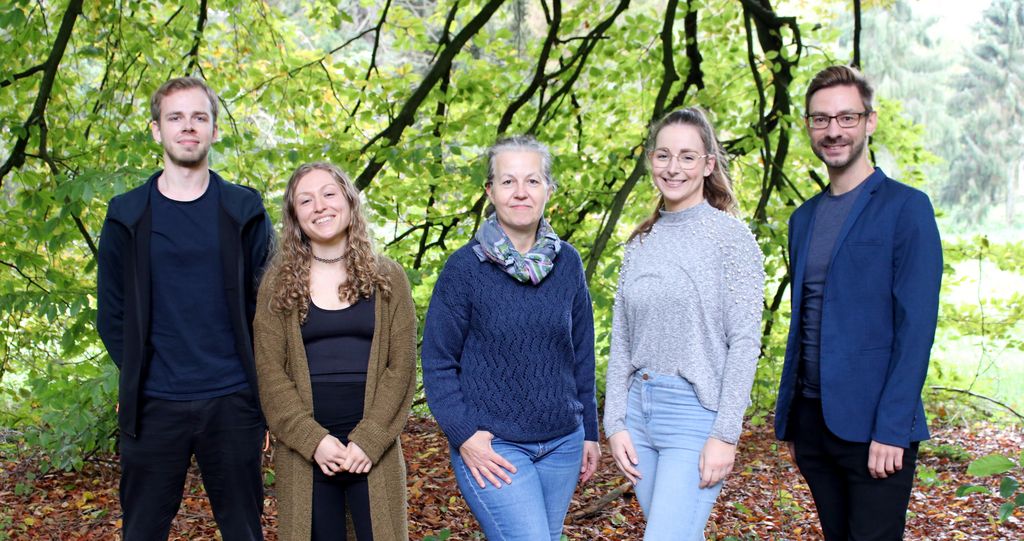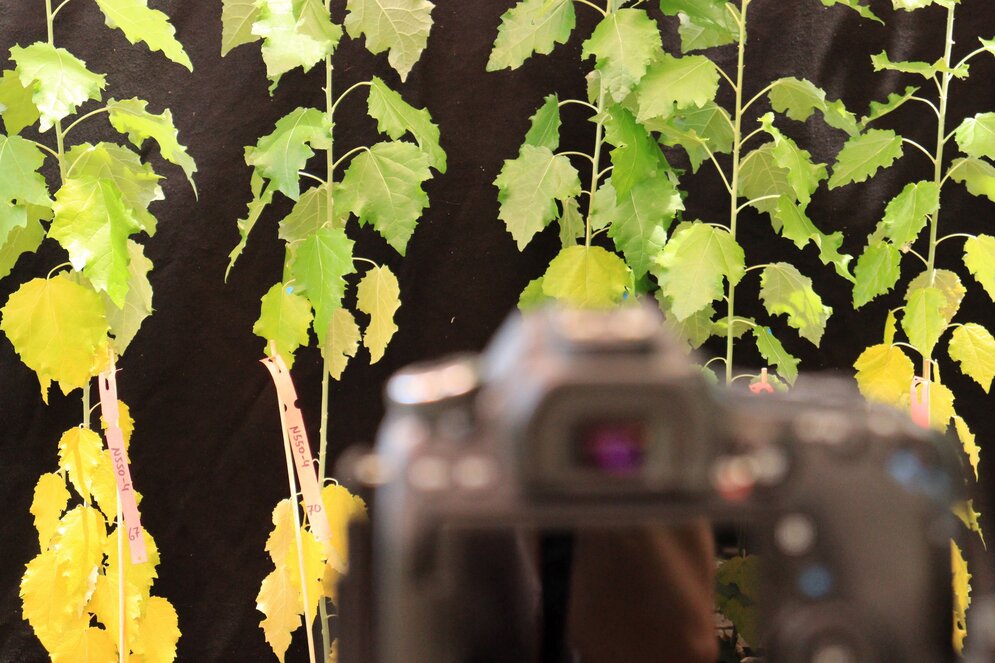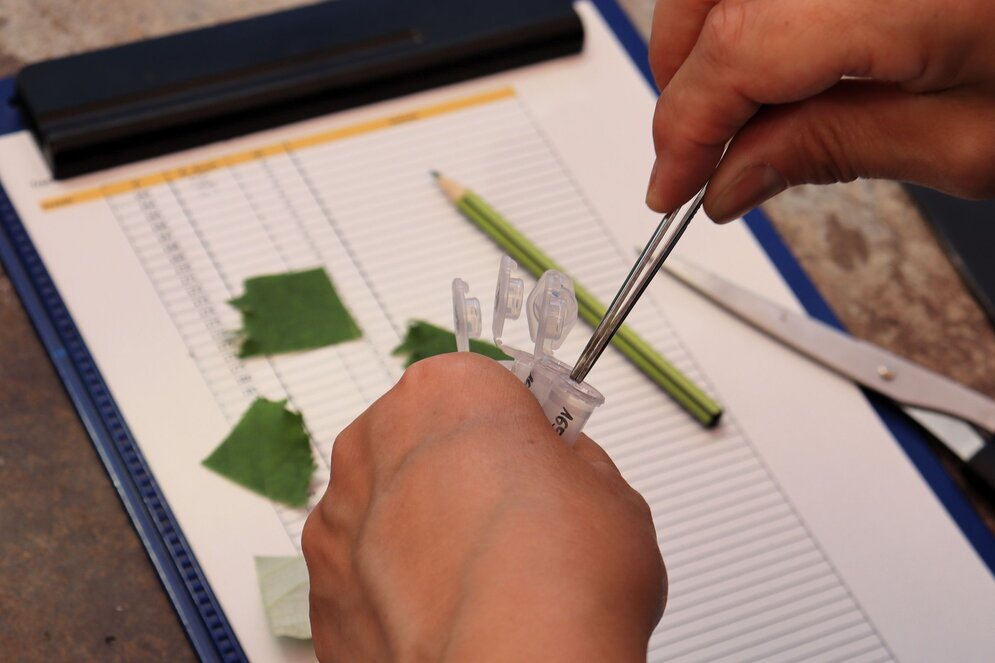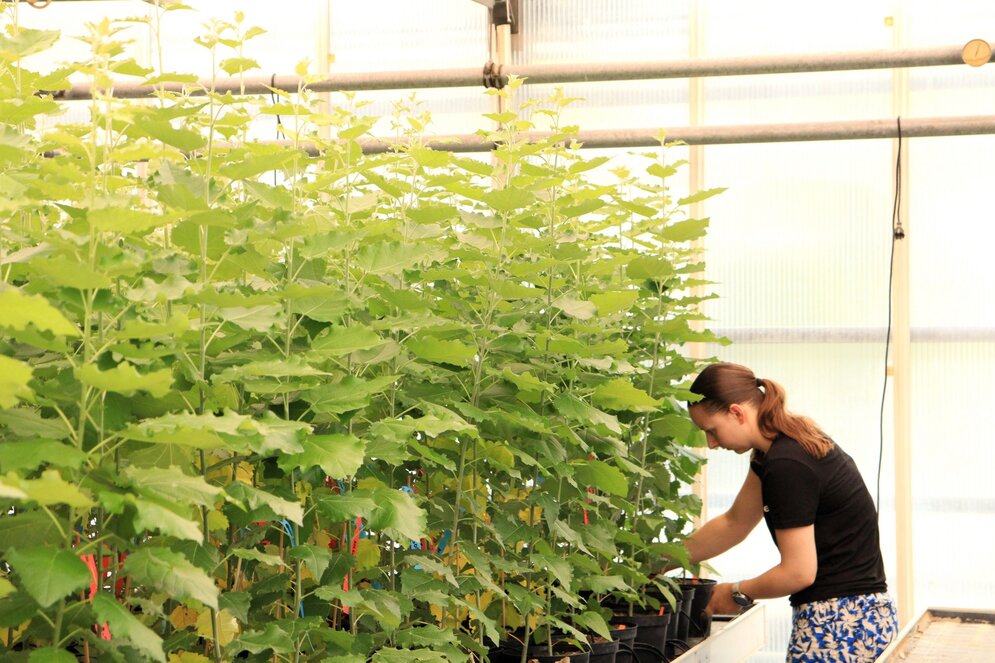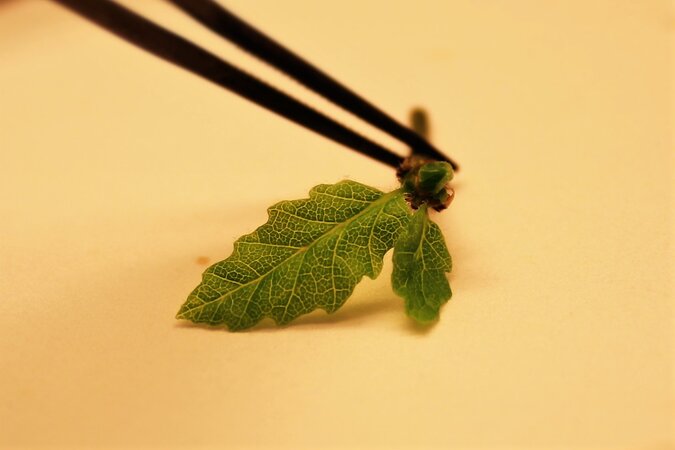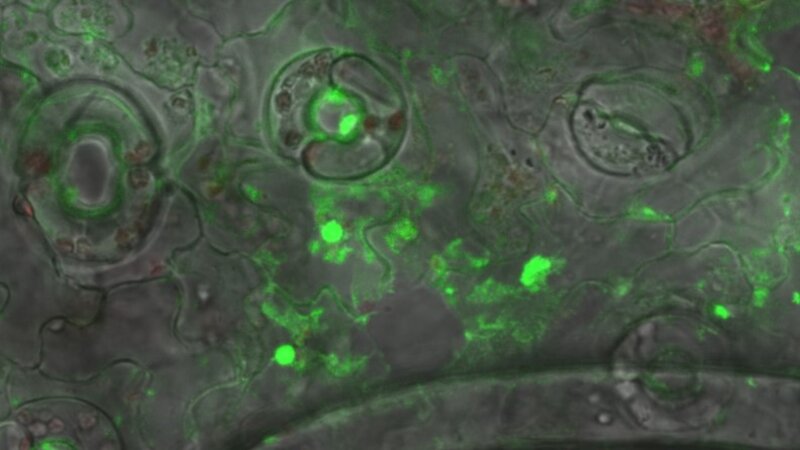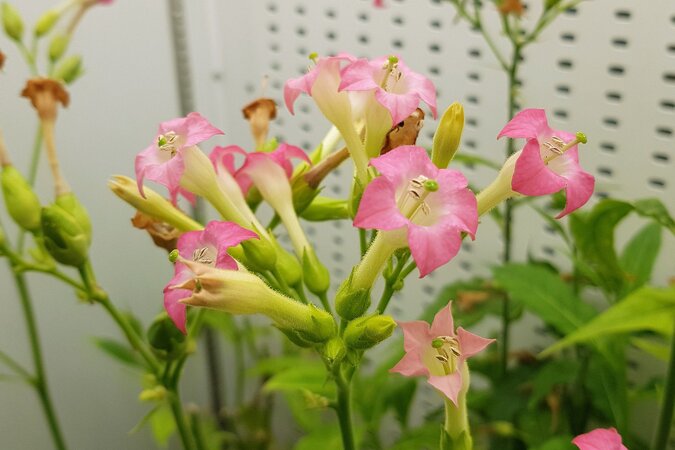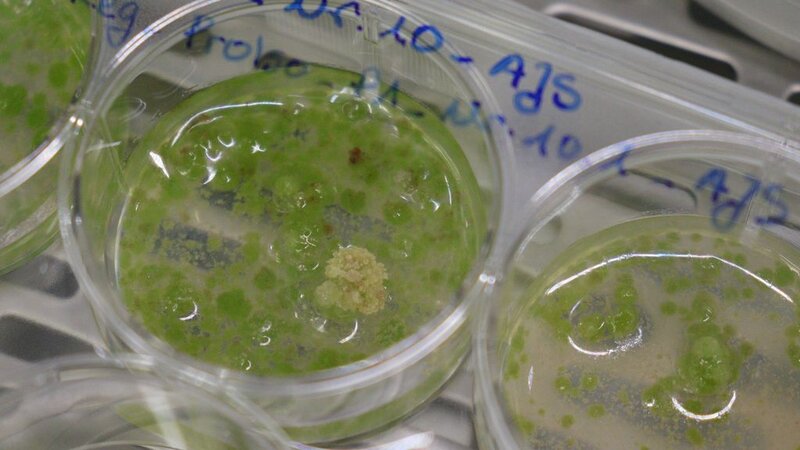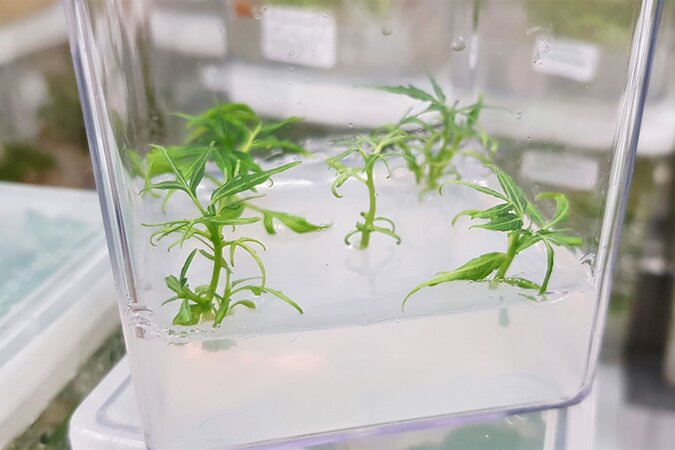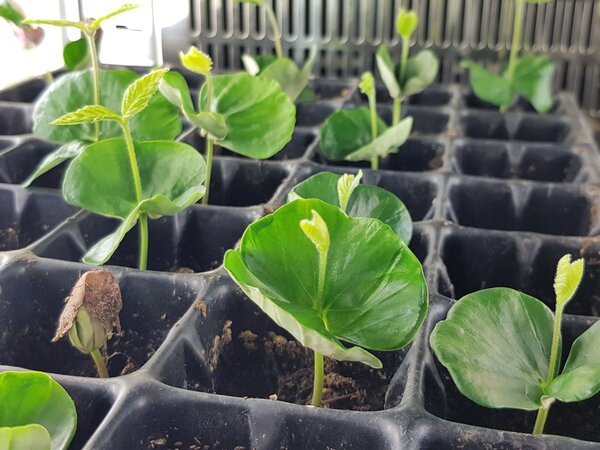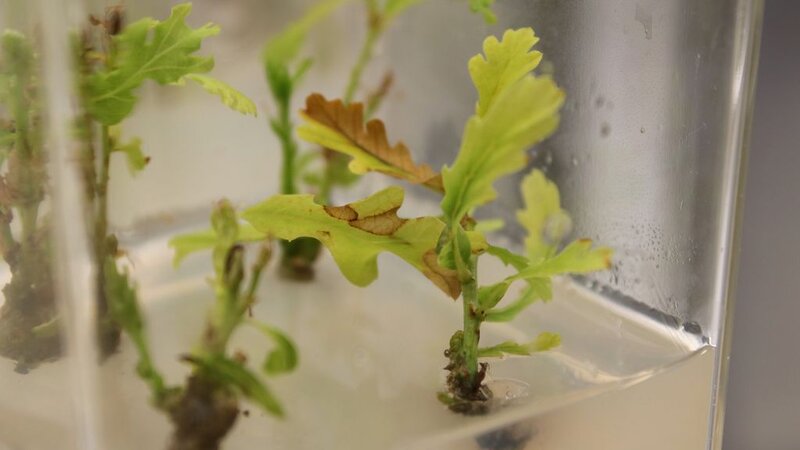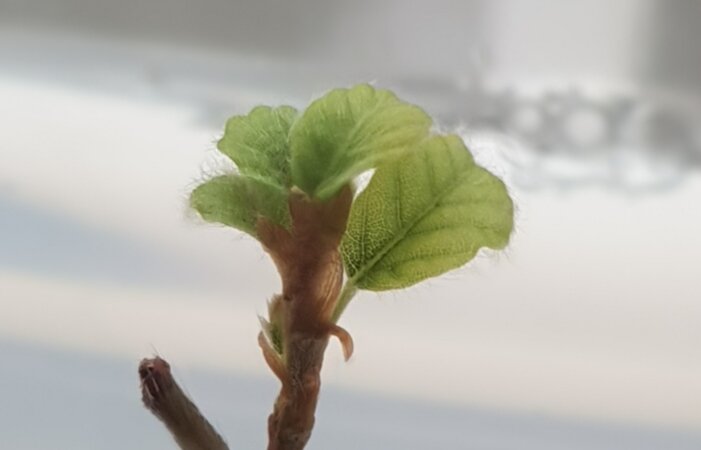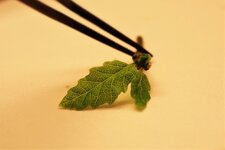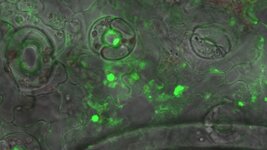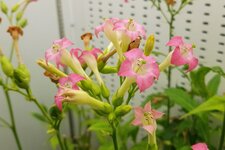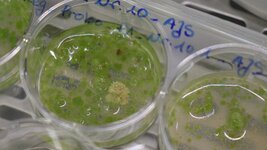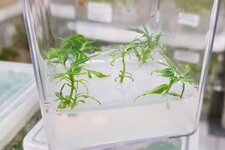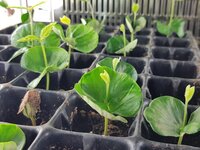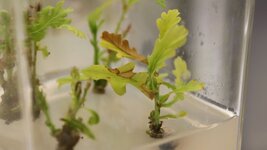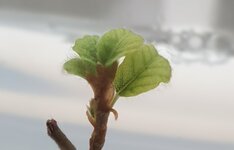Genetic Technologies
Junior Research Group
The "Genetic Technologies" Group is an independent junior research group at the Thünen Institute of Forest Genetics within the project "TreeEdit", funded by the Agency of Renewable Resources ("Fachagentur Nachwachsende Rohstoffe", FNR).
We are studying CRISPR/Cas-mediated genome editing of trees, in particular whether and how these methods work in woody plants and what potentials and risks are associated with them. Thus, we are expanding the knowledge regarding these technologies in tree species, which is often based on results from crop research.
In addition to this method development, the Genetic Technologies Group also conducts research in the field of climate adaptation. Poplars serve us as model organisms on which the genetic background of drought stress tolerance is investigated. By experimentally modifying the genes involved, we aim to draw conclusions about their function. The results will be transferred to the most important German deciduous tree species, the European beech Fagus sylvatica.
In a subproject, we are investigating the gene expression of European beech of different provenances under drought stress. With this, we hope to obtain insights into the natural stress response of European beech and which differences exist between Central and Southern European beech. With our partners we combine genetic, molecular and physiological analyses.
People
Dr. Tobias Brügmann (group leader)
Alexander Fendel (PhD student)
Virginia Zahn (PhD student)
Susanne Jelkmann (technical assistant)
Emily Idahl (master student, since January 2025)
Godje Ross (bachelor student, since March 2025)
Amelie Keller (bachelor student, since May 2025)
Luisa Bisping (bachelor student, since May 2025)
+ one technician trainee in lab rotation
Poplars under drought stress - or perhaps not?
How do our poplars respond to drought?
In our research project, we aim to characterize selected genes in poplars and investigate whether they are involved in the drought stress tolerance of trees. We examine whether an increased expression of a selected gene or the knockout of the gene leads to greater resistance to drought in poplars.
Under controlled greenhouse conditions, numerous measurements can be obtained using invasive (leaves are taken from the tree) and non-invasive methods (leaves remain on the tree), which allow us to track the stress response. In addition to physiological and morphological analyses in the greenhouse, a wide range of molecular physiological analyses will be conducted in the laboratory. Here, we specifically investigate whether the plants experienced oxidative stress, their proline content (a marker for stress response), and how much abscisic acid, a key stress hormone, was produced.
Attached to this work are two Master's theses in cooperation with the universities in Hannover and Hamburg.
Alexander Fendel and Tobias Brügmann have described the conceptualization and evaluation of such stress experiments in an article in the German journal AFZ-DerWald: Fendel A, Brügmann T (2023) "Kontrolliert unter Stress." AFZ Der Wald 78(20):12-15.
Stress trials in the climate forest
Project module
European beech trees have a large distribution area. At its southern edge, they are confronted with different climatic conditions than in Germany: the average annual temperature is higher and the amount of precipitation is lower than in Germany. To investigate the different drought stress tolerance of beech provenances, a provenance trial ("climate forest") was planted in Berlin. Here, individual trial members (a group of trees) can be irrigated, while other trial members are affected by the (naturally occurring) drought stress in summer. A drought stress experiment was initiated in the summer of 2022 with one provenance each from Germany, France, Italy and Spain. Ecophysiological, biochemical, and genetic analyses were conducted using different stress intensities. The data will be used to estimate the drought stress tolerance of individual European beech provenances.
Genetic regulations will be investigated by transcriptome analysis. For this purpose, all mRNA molecules produced in the leaves will be decoded. Biochemical analyses include measuring the levels of the drought stress markers proline, malondialdehyde (MDA), and peroxide. Together with physiological data such as photosynthetic activity, stomatal conductance, and water potential, the analytical triad should provide a comprehensive picture of drought stress tolerance.
We expect answers to the questions: What is the response of European beech under drought stress? Do the selected provenances differ in their drought stress response? Which genes are switched on or off and how fast or how strongly is gene activity regulated? Is provenance-dependent differential stress tolerance related to differential gene regulation? The findings from this collaborative research may be helpful in selecting suitable drought-tolerant provenances.
Cooperation partners
Ecology of Plants, Free University of Berlin (PD Dr. M. Forstreuter)
Plant Biotechnology and Bioinformatics, Braunschweig University of Technology (Prof. Dr. B. Pucker)
Study, Training & Guest Scientists
Bachelor's and master's theses as well as university internships can be carried out in our laboratory. Furthermore, we participate in the training of biological-technical assistants. The trainees are integrated into our research activities in four-month blocks. If you are interested or have any questions, please contact Tobias Brügmann.
Felix Wiedemann (2024) Charakterisierung von PcP5Cs1-Überexpressionslinien in Populus x canescens unter kontrollierten Trockenstressbedingungen
Master thesis, course biotechnology, University of Hannover
Dr. Anke Bollen (2024) Infiltration rekombinanter Ribonukleotidproteinkomplexe (RNP) zur DNA-freien Genomeditierung an Pflanzen als unterstützende Maßnahme zum Erhalt der Biodiversität
Master thesis, course applied environmental sciences, University of Koblenz
Yuna Hartschen (2024)
Student trainee, University of Düsseldorf
Ina Martini (2023) Etablierung der Fluoreszenzmarker-basierten Effizienzbestimmung modifizierter guide-RNAs in Pappelprotoplasten [mit SpCas9 und Lb-ttCas12a]
Bachelor thesis, course Biotechnology, Hochschule Emden-Leer
[Establishment of Fluorescence Marker-Based Efficiency Determination of Modified Guide RNAs in Poplar Protoplasts [with SpCas9 and Lb-ttCas12a]]
Alina Fomin (2023) Biochemical analyses of drought stress-related markers and promoter analysis of P5CS1 in European beech (Fagus sylvatica) of different provenances
Bachelor thesis, course Biochemistry, University of Lübeck
Keelin Meyer (2023) Agrobakterium-vermittelte Transformation der Europäischen Buche (Fagus sylvatica)
Bachelor thesis, course Biotechnology, Hochschule Emden-Leer
[Agrobacterium-mediated transformation of European beech (Fagus sylvatica)]
Franziska Brunozzi (2023)
Student trainee, TU Munich
Prof. Dr. Stefano Biricolti (2022): Guest scientist
University of Florence
Thalia von Nethen (2022) Promotor-Tests in Nicotiana benthamiana zur Optimierung der Effizienz von CRISPR/Cas-vermittelter Genomeditierung
Bachelor thesis, course Biotechnology, Hochschule Emden-Leer
Stefan Zebbedies (2021) Etablierung der Nickase-Genomeditierung in Pappeln.
Bachelor thesis, course Renewable Resources, Hochschule Hannover
[Establishing the nickase-mediated genome editing in poplars]
Oliver Sulkowski (2020) Molekularbiologische Untersuchung auf erhöhte Salz- und Trockenstresstoleranz in SCL4- und SCL7-überexprimierenden Pappelhybriden (Populus × canescens).
Bachelor thesis, course Biotechnology, Hochschule Emden-Leer
[Analysis of salt and drought stress tolerance in SCL4 and SCL7 overexpression poplar hybrids]
Partners
The Genetic Technologies Group interacts with scientists from several research institutions. These are in particular:
Thünen Institute of Forest Genetics
- Genome Research, Thünen Institute of Forest Genetics (Dr. N. Müller)
- Resistance Research, Thünen Institute of Forest Genetics (Dr. B. Bubner)
National Partners
- Plant Ecology, Free University of Berlin (PD Dr. M. Forstreuter)
- Molecular Plant Genetics, University of Hamburg (Dr. D. Becker + Prof. Dr. J. Kehr)
- Plant Biotechnology and Bioinformatics, Technische Universität Braunschweig (Prof. Dr. B. Pucker)
- Ecophysiology, University of Bonn (Prof. Dr. L. Schreiber)
- Institute of Wood Sciences, University of Hamburg (Prof. Dr. A. Krause + Prof. Dr. L. Hesse)
- Biochemistry of plant specialised metabolites, Leibniz-Universität Hannover (Prof. Dr. J. Franke)
- Centre for Plant Genome Engineering, Heinrich-Heine-Universität Düsseldorf (Dr. G. Hensel)
International Partners
- Instytut Dendrologii Polskiej Akademii Nauk, Kornik, Poland (Prof. P. Chmielarz)
- Universität Concepción, Chile (Dr. Sofia Valenzuela)
- Universität Novi Sad, Bosnien-Herzegowina (Dr. V. Galovic)
Former Partners
- Plant Genetics, Albert-Ludwig-University Freiburg (PD Dr. R. Welsch)
- Istituto Biometeorologia IBIMET-CNR, Bologna, Italy (Dr. E. Gatti)
Publications
- 0
Zahn V, Sievers A-J, Kersten B, Fladung M, Brügmann T (2026) First report of genetic transformation and CRISPR/Cas12a-mediated gene editing of European beech (Fagus sylvatica L.) [Preprint]. Cold Spring Harbor: bioRxiv, 31 p, DOI:10.64898/2026.02.06.703565
- 1
Fendel A, Fladung M, Brügmann T (2026) Overexpression of PtaHDG11 enhances drought tolerance and suppresses trichome formation in Populus tremula × Populus alba [Preprint]. Cold Spring Harbor: bioRxiv, 33 p, DOI:10.64898/2026.01.12.699028
- 2
Zahn V, Fendel A, Sievers A-J, Fladung M, Brügmann T (2025) Benefiting from the past : establishing in vitro culture of European beech (Fagus sylvatica L.) from provenance trial trees and seedlings. Plant Methods 21:31, DOI:10.1186/s13007-025-01350-3
- 3
Brügmann T, Zahn V, Fendel A, Fladung M (2025) Biotechnologische Innovationen an Rotbuchen und weiteren Baumarten. Thünen Rep 119:211-216, DOI:10.3220/253-2025-23
- 4
Wodtke S, Fendel A, Brügmann T (2025) Brush them away : a simple method to remove trichomes and visualize stomata. Mar 24, 2025. Berkeley: protocols io, DOI:10.17504/protocols.io.kxygxwjqwv8j/v1
- 5
Grünhofer P, Herzig L, Zhang Q, Vitt S, Stöcker T, Malkowsky Y, Brügmann T, Fladung M, Schreiber L (2024) Changes in wax composition but not amount enhance cuticular transpiration. Plant Cell Environ 47(1):91-105, DOI:10.1111/pce.14719
- 6
Brügmann T, Fendel A, Zahn V, Fladung M (2024) Genome editing in forest trees. In: Ricroch A, Eriksson D, Miladinovic D, Sweet JB, Laere K van, Wozniak-Gientka E (eds) A roadmap for plant genome editing. Cham: Springer, pp 347-372, DOI:10.1007/978-3-031-46150-7_20
- 7
Brügmann T, Fladung M (2024) Genscheren in der Forstpflanzenzüchtung? AFZ Der Wald 79(5):27-30
- 8
Brügmann T, Orgel F, Jelkmann S, Schröder H (2024) Isolation of high quality RNA from tree leaves using Polyclar in the Spectrum Plant Total RNA Kit. Oct 08, 2024. Berkeley: protocols io, DOI:10.17504/protocols.io.14egn6qkml5d/v1
- 9
Rupps A, Thiesen FN, Raschke J, Walther M, Ehmke E, Safranek L, Eckardt J, Schmidt A, Beck W, Bubner B, Eisold A-M, Zahn V, Fendel A, Brügmann T (2024) PInK-NET: Resuming the network idea of in vitro tree labs in Germany. In: Sota V, Werbrouck S (eds) In vitro culture of woody crops: problem solving by new approaches : The 2nd Conference of Cost Action CA21157 CopyTree, 22-24 April, 2024, Bulduri Technical School, Jurmala, Latvia ; Book of proceedings. pp 221-230
- 10
Cardi T, Murovec J, Bakhsh A, Boniecka J, Brügmann T, Bull SE, Eeckhaut T, Fladung M, Galovic V, Linkiewicz A, Lukan T, Mafra I, Michalski K, Kavas M, Nicolia A, Nowakowska J, Sagi L, Sarmiento C, Yildirim K, Zlatkovic M, et al (2023) CRISPR/Cas-mediated plant genome editing: outstanding challenges a decade after implementation. Trends Plant Sci 28(10):1144-1165, DOI:10.1016/j.tplants.2023.05.012
- 11
Shahzaib M, Brügmann T, Shakeel M, Khan SH, Azhar MT, Atif RM, Fladung M, Rana IA (2023) Development of climate smart fruit plants via CRISPR/Cas genome editing systems: A spatiotemporal review [Preprint]. 2023051887. Basel: Preprintsorg, 22 p, DOI:10.20944/preprints202305.1887.v1
- 12
Zahn V, Sievers A-J, Fladung M, Brügmann T (2023) Etablierung einer stabilen in vitro-Kultur für Fagus sylvatica - Ein erster Schritt hin zur Genomeditierung in Buchen. Thünen Rep 105:9-10
- 13
Fendel A, Brügmann T (2023) Kontrolliert unter Stress. AFZ Der Wald 78(20):12-15
- 14
Brügmann T, Zahn V, Fendel A, Zebbedies S, Sievers A-J, Becker D, Fladung M (2023) Neue biotechnologische Methoden für Gehölze. Thünen Rep 105:6-8
- 15
Fendel A, Fladung M, Brügmann T (2023) Steigerung der Trockenstresstoleranz in Bäumen durch genetische Modifikationen. Thünen Rep 105:88-89
- 16
Riefler M, Brügmann T, Fladung M, Schmülling T (2022) A constitutively active cytokinin receptor variant increases cambial activity and stem growth in poplar. Int J Mol Sci 23(15):8321, DOI:10.3390/ijms23158321
- 17
Zahn V, Sievers A-J, Fladung M, Brügmann T (2022) A reliable in vitro culture system for Fagus sylvatica - first steps to expend the scope of genome editing in forest trees to beech. In: Plant Sciences for a Sustainable Future : Botanik-Tagung, International Conference of the German Society for Plant Sciences, 2022 Bonn, 28 August - 01 September ; Programme. Deutsche Botanische Gesellschaft, p 249
- 18
Zahn V, Brügmann T, Fladung M (2022) Combining bacterial and viral elements for efficient gene targeting in poplar. In: Plant Sciences for a Sustainable Future : Botanik-Tagung, International Conference of the German Society for Plant Sciences, 2022 Bonn, 28 August - 01 September ; Programme. Deutsche Botanische Gesellschaft, p 85
- 19
Zahn V, Fladung M, Brügmann T (2022) Combining bacterial and viral elements for efficient gene targeting in poplar. In: COST Action CA18111 "Genome Editing in Plants" : Book of Abstracts ; 3rd PlantEd Conference, 5 - 7 September 2022, Düsseldorf, Germany. p 24
- 20
Brügmann T, Zebbedies S, Zahn V, Fladung M (2022) Diverse mutation patterns include large deletions in a CRISPR/nCas9 double nicking approach poplar. In: COST Action CA18111 "Genome Editing in Plants" : Book of Abstracts ; 3rd PlantEd Conference, 5 - 7 September 2022, Düsseldorf, Germany. p 48
- 21
Brügmann T, Zebbedies S, Zahn V, Fladung M (2022) Diverse mutation patterns include large deletions in a CRISPR/nCas9 double nicking approach poplar. In: Plant Sciences for a Sustainable Future : Botanik-Tagung, International Conference of the German Society for Plant Sciences, 2022 Bonn, 28 August - 01 September ; Programme. Deutsche Botanische Gesellschaft, p 248
- 22
Brügmann T, Fladung M, Schröder H (2022) Flexible DNA isolation procedure for different tree species as a convenient lab routine. Silvae Genetica 71:20-30, DOI:10.2478/sg-2022-0003
- 23
Fendel A, Fladung M, Brügmann T (2022) Improvement of drought stress tolerance in poplars (Populus) by modification of candidate genes. In: COST Action CA18111 "Genome Editing in Plants" : Book of Abstracts ; 3rd PlantEd Conference, 5 - 7 September 2022, Düsseldorf, Germany. p 35
- 24
Fendel A, Fladung M, Brügmann T (2022) Improvement of drought stress tolerance in poplars (Populus) by modification of candidate genes. In: Plant Sciences for a Sustainable Future : Botanik-Tagung, International Conference of the German Society for Plant Sciences, 2022 Bonn, 28 August - 01 September ; Programme. Deutsche Botanische Gesellschaft, p 104
- 25
Shrestha A, Fendel A, Nguyen TH, Adebabay A, Kullik AS, Benndorf J, Leon J, Naz AA (2022) Natural diversity uncovers P5CS1 regulation and its role in drought stress tolerance and yield sustainability in barley. Plant Cell Environ 45(12):3523-3536, DOI:10.1111/pce.14445
- 26
Brügmann T, Biricolti S, Becker D, Fladung M (2022) On track towards DNA-free genome editing. In: COST Action CA18111 "Genome Editing in Plants" : Book of Abstracts ; 3rd PlantEd Conference, 5 - 7 September 2022, Düsseldorf, Germany. p 49
- 27
Brügmann T, Deecke K, Fladung M (2019) Evaluating the efficiency of gRNAs in CRISPR/Cas9 mediated genome editing in poplars. Int J Mol Sci 20(15):3623, DOI:10.3390/ijms20153623
- 28
Brügmann T, Fladung M (2019) Genom-Editierung in Bäumen. AFZ Der Wald 74(5):16-18
- 29
Brügmann T, Wetzel H, Hettrich K, Smeds A, Willför S, Kersten B, Fladung M (2019) Knockdown of PCBER1, a gene of neolignan biosynthesis, resulted in increased poplar growth. Planta 249(2):515-525, DOI:10.1007/s00425-018-3021-8
- 30
Brügmann T, Fladung M (2019) Overexpression of both flowering time genes AtSOC1 and SaFUL revealed huge influence onto plant habitus in poplar. Tree Genetics Genomes 15:20, DOI:10.1007/s11295-019-1326-9
- 31
Brügmann T, Polak O, Deecke K, Nietsch J, Fladung M (2019) Poplar transformation. Meth Mol Biol 1864:165-177
- 32
Brügmann T, Fladung M (2016) Flowering time genes influence biomass production in poplars. In: Hensel G (ed) Annual meeting : new breeding technologies in times of politically enforces research prohibition ; German Society of Plant Biotechnology e.V. ; book of abstracts ; Gatersleben, 02.-04.05.2016. Gatersleben: Gesellschaft für Pflanzenbiotechnologie, p 23
- 33
Brügmann T, Polak O, Fladung M (2015) Development and use of novel gene technologies to increase biomass yield in the woody perennial Populus spec. (PopMass) : project A - modification of genes expressed in xylem and flower. In: Conference documents Plant 2040 Status Seminar, March 4 - 6, 2015 in Potsdam. pp 67-68
- 34
Brügmann T, Fladung M (2015) Genetic approaches to increase biomass yield in the woody perennial Populus. In: Vettori C, Vendramin GG, Paffetti D, Travaglini D (eds) IUFRO Tree Biotechnology 2015 Conference : "Forests: the importance to the planet and society" ; 8-12 June 2015, Florence, Italy ; Proceedings. Florenz: IUFRO, pp 507-509
- 35
Schröder H, Brügmann T, Fladung M (2015) Nuclear and chloroplast SNP markers support successful poplar breeding. In: Vettori C, Vendramin GG, Paffetti D, Travaglini D (eds) IUFRO Tree Biotechnology 2015 Conference : "Forests: the importance to the planet and society" ; 8-12 June 2015, Florence, Italy ; Proceedings. Florenz: IUFRO, pp 295-296
- 36
Hönicka H, Fladung M, Lehnhardt D, Brügmann T (2013) Pleiotropic effects of "flowering" genes in transgenic poplar. In: SPP1530 workshop: Pleiotropic effects of flowering time genes and impact on adaptation and speciation, January 21-23,2013, Max Planck Institute for Plant Breeding Research, Köln. p 13
- 37
Brügmann T, Fladung M (2013) Potentials and limitations of the cross-species transfer of nuclear microsatellite marker in six species belonging to three sections of the genus PopulusL.. Tree Genetics Genomes 9(6):1413-1421, DOI:10.1007/s11295-013-0647-3
- 38
Brügmann T (2011) Entwicklung molekularer Marker zur genetischen Charakterisierung von Genotypen verschiedener Arten der Gattung Populus L.. Hamburg: Universität, 134 p, Hamburg, Univ, Fachber Biologie, Masterarbeit, 2011
- 39
Brügmann T (2009) Optimierung von RNA-Extraktion und cDNA-Synthese aus Quercus robur. Hamburg: Univ, 76 p, Hamburg, Univ, Department Biologie, Bachelorarbeit, 2009
Funding
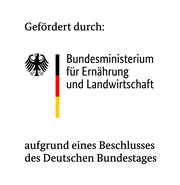
The Genetic Technologies Junior Research Group is financially supported by the Federal Ministry of Food and Agriculture through the Agency of Renewable Resources (FNR) (funding code 2219NR359).
The related project "TreeEdit" is part of the Department of Genome Research.

